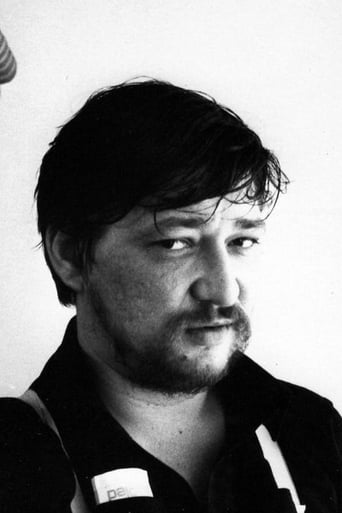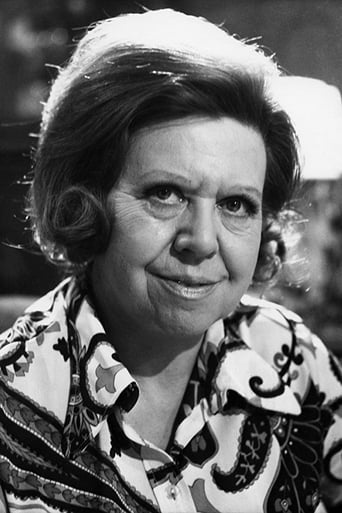Linbeymusol
Wonderful character development!
UnowPriceless
hyped garbage
Pluskylang
Great Film overall
Glimmerubro
It is not deep, but it is fun to watch. It does have a bit more of an edge to it than other similar films.
Michael J Salmestrelli (vonnoosh)
This film comes across as a very ambitious project. It features Rainer Werner Fassbinder (only acting, he has no creative role in the project beyond that as far as I can tell) in the lead. It has appearances by Franco Nero and Brigitte Mira. Co starring is early Fassbinder regular Gunther Kaufman. The point is, the cast is pretty damn good.The soundtrack is entirely original and is penned by Edgar Froese of Tangerine Dream. I am assuming that was not cheap for the producers to arrange.With a good cast, good soundtrack, you have what appears to be a good futuristic sci fi script. An antihero cop and his partner are called in to organize an evacuation of the building for the most important corporation in the country (or world, was a little fuzzy of how far it reached). The bomb threat turns out to be a hoax, then things get twisted and confusing. I'd describe the story has having half devils battling half angels except you can't tell if they are fighting themselves or there really is a certain opposition. The film ends with major events not appearing on film. In fact, the film feels like it's missing most of the third act before coming to an abrupt conclusion. You sort of have closure during the very end but the exposition is coming from a news broadcast. It could have been thrown on in post production just to save the project and get it rushed to release in time to still cash in on the international success of Blade runner (both are futuristic sci fi stories but Blade Runner debuted a month before this), or perhaps to capitalize on the untimely death of Fassbinder who died unexpectedly 6 weeks before this film was released.Regardless of the reasons, you get what might have been a complex story, well acted and brought to life via an interesting plot and without the need for cheap special effects. Alas, you get the pretense of a good story and are stuck trying to piece together the events in the second and third acts. It's a chore.I've watched this several times. I, like most I imagine, was drawn to this movie if only to see the type of film project Fassbinder would simply act in without much more creative input. The film looked like it was trying to follow the same approach of Fassbinder sci fi experiments like World on a Wire. Maybe if Kamikaze '89 were almost three and a half hours long to explain what the heck is happening like World On A Wire is then perhaps things would be different. Instead, good luck with the 106 minutes you get.
versionthirteen
Kamikaze 1989 is an ambivalent film that manages to be both anti-corporate and anti-statist at the same time. It was perfect for 1982 when I was an anarcho-rightist skateboard punk. Today, it couldn't be appreciated by 1 in 100,000. This is the last of the great pre-Microsoft/ pre-End-of-USSR films that sought to reflect the hunger of the dawning information age. A bad phosphorescent TV look to the film makes it look fresh in our day. Fassbinder is Lt. Jansen and his investigations are predominately self-defeating - and that could be the point.Disguised as a predator, Lt.Jansen is an amoral and voyeuristic, yet totally flaccid being. Tired and sluggish this detective only incriminates himself - but the Inquisitor he faces - is us.I liked this odd movie - it is neither all low nor all high-brow art. It will probably put many to sleep - the violence is gratuitous and minimal, the main character is a walking dead man (interesting fact is that Fassbinder after dying in real life was BURIED in the costume of Lt.Jansen) - it has a charm that remains intact despite its pedigree as art-house junk.
hasosch
Wolf Gremm's "Kamikaze 1989" portrays a Germany that is rich, in which all problems are solved, where there is no pollution of the environment, where people work in sterile dust-free rooms with artificial light and air-conditioning, where alcohol is forbidden, since it causes incalculable reactions, where private persons are not allowed to grow vegetables on their own, since seeds may be contaminated, where there are, finally, no suicides anymore, but just cases of "unexpected death". The whole industry is in the hand of one gigantic concern, and all of its leading crew are family members. Competition is excluded, since creativity is dangerous. Even the handful of intellectuals who are working in the "cultural" department of the concern, have just to confirm the "intellectual" doctrine of the concern. Thus, the totalitarian company represents the good, because what is good is always associated with might (cf. the definition of the "axis of evil"). And since everything seems to be under control, the position of the evil is empty. However, strictly speaking, good cannot exist without evil and vice versa, because these ethic terms define one another logically. However, the position of evil is empty only until the company gets a bomb threat. It seems that the "spirit of evil", Krysmopompas, whose members once belonged to the "prokos", the intellectuals that used to work in the hidden 31st floor of the building, are behind the threat.Police lieutenant Jansen, unforgettably played by Rainer Werner Fassbinder in his last role, is charged with the investigation, during which the open position of Krysmopompas is offered to him several times, but he refuses to take it over. Since the concern represents the good, the police must represent the evil. Even the police president is in the hand of the concern and looks like a caricature of Dr. Mabuse turned himself into a puppet. Possibly Jansen realizes that becoming Krysmopompas and thus fulfilling the vacuum of evilness would just consolidate the omnipotent concern, because it needs the evil to define itself as the good. Consequently, the director of the concern offers him a job, which Jansen also refuses. Therefore, Jansen takes a third position in a world in which there are only two, and this is presumably the reason why the movie is called "Kamikaze". However the title may be meant, this movie offers a highly complicated situation in which the categories of ethics are perverted. The typical 80ies' German TV-style of this movie should not make the audience blind that in portraying paradoxical ethical categories in a world in which metaphysics has been shoveled out like the alcohol, the seeds and suicide, "Kamikaze" goes way beyond thematically related movies like Godard's "Alphaville", Kubrik's "Dr. Strangelove" and even Tarkovsky's "Solyaris". A few years before "Kamikaze 1989", Fassbinder himself had directed the science-fiction movie "Welt am Draht" ("World on wire") which many people believe to have surpassed "Solyaris". In the final scene of Kamikaze, Fassbinder says his ultimate goodbye to his audience grinning in front of a picture of Armstrong's moon landing.
vlvetmorning98
1989, to be precise. As imagined by Germans in 1982. Germany has become the world's foremost economic superpower, suicide is a thing of the past, and everyone does drugs, except there are no nasty side effects anymore. An overweight Rainer Werner Fassbinder mostly scowls his way through a quest to find out who's behind a series of murders that may be linked to a new resistance group. Or something like that. The plot seems secondary to the outrageous costumes (Fassbinder wears leopard tights throughout the whole film) and scenarios (like a police discotheque where you can shoot on firing ranges). It's an ugly film, and a stupid one, too, but it is perversely fascinating, and worth watching once, if only to impress your friends.





